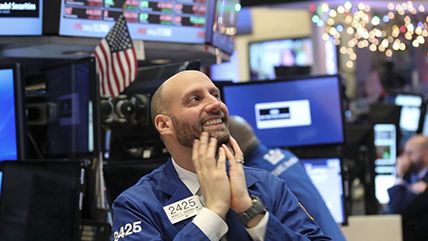Why Are Markets Rejoicing at Trump's Win?
The incoming president may not be good for the economy in the long run.

On the evening of November 8, 2016, as it became clear that assumptions about Hillary Clinton's certain electoral victory were wrong, investors began to squirm. Dow futures dropped by more than 700 points that night, and the liberal economist Paul Krugman wrote at The New York Times that "if the question is when markets will recover, a first-pass answer is never."
The next morning, however, the stock market completed a stunning reversal to end at a record high. What some have called a "Trump rally" has continued ever since, with the Dow Jones Industrial Average hovering just above the 20,000 mark at press time.
One explanation for Wall Street's seeming euphoria is that investors believe they're now less likely to see the continuation of tax hikes and micro-regulation desired by the Clinton campaign.
True, it's impossible to know what Donald Trump's win heralds on the policy front in the long term. But at least for now, the market appears to be betting that the new president will make good on campaign promises that businesses expect to be good for their bottom lines. The Republican sweep could pave the way, for instance, for a long overdue reform of the individual and corporate tax codes.
Right now, explains Cato Institute researcher Chris Edwards, corporations keep just $65 of every $100 in profits they earn, after taxes are taken out. "Trump is saying they will get to keep $85," he says. "If the profit stream increases by 30 percent ($85 vs. $65), so should the market value." After all, "in theory, stock valuations are the present value of future after-tax net profits to companies. So when you cut the tax rate on profits a lot, the [present value] of the net profits—the net cash—to the shareholders rises a lot."
The S&P Financials Index returned 16.75 percent from Election Day through year end, compared to 5.98 percent for the S&P as a whole. This suggests markets are bullish about the possibility that Trump will loosen Wall Street–specific regulations such as those in Dodd-Frank. Multinational companies may also have concluded they'll be allowed to repatriate some of their foreign cash holdings to the U.S. at a lower cost than they could have under Clinton.
None of which means the markets are right. Andrew Hofer, the head of Taxable Fixed Income at Brown Brothers Harriman & Co., thinks markets may be overcorrecting for a bout of pessimism that started in late 2015. "Now that we seem to have passed through that period without the sky falling, sentiment may be overshooting in the other direction," he says. "Trump's election has been the convenient foil on which the market can project its optimism. Market multiples have increased rapidly on the same slow positive change in fundamentals, but with little attention to the greater uncertainty this administration brings around global trade, interest rates, inflation, geopolitical risk, and institutional continuity."
In other words, there's plenty to be nervous about, too. "The market seems to be pricing in a lot of positive news, and we don't have a great deal of evidence to base that on," said Steve Major, the global head of fixed-income research at HSBC Holdings PLC, in a recent interview with The Wall Street Journal. While consumer confidence is at its highest level since 2007, the Federal Reserve's latest survey of current economic conditions—a document known as the Beige Book—offers little evidence that the election has had an impact on the actual economy.
Not surprisingly, many market observers don't expect the excitement to last. With nearly $20 trillion in national debt on the books, entitlement and pension crises on the horizon, and no plan to address any of that, it's difficult to see how Trump's tax cuts, if they materialize at all, can be sustained in the long run. And then there are the market risks that would come if Trump wages a trade war with China and Mexico.
Considering Republicans' terrible track record when it comes to fighting for concrete pro-market policies, I'd say protectionism, cronyism, higher spending, an ill-thought-out Obamacare repeal, and/or a scandal involving Trump's business empire seem far more likely than 5 percent economic growth and booming markets. Enjoy the high while it lasts.
This article originally appeared in print under the headline "Why Are Markets Rejoicing at Trump's Win?."


Show Comments (71)